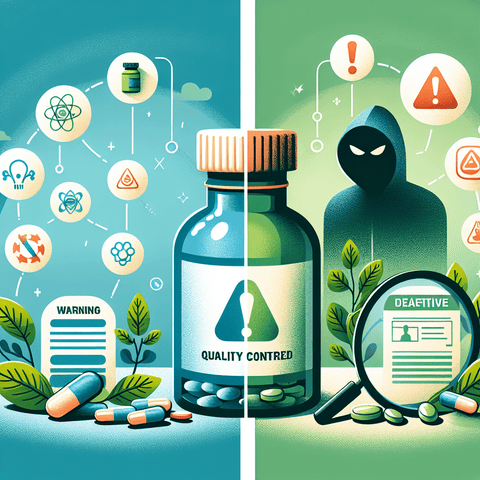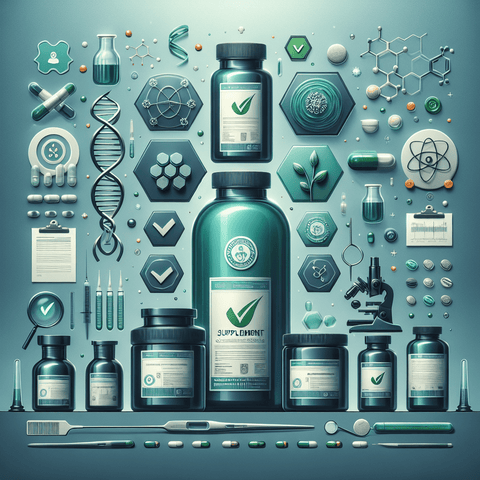Introduction
In today's digitized and health-conscious world, the appeal of nutritional supplements has never been stronger. As more people strive to improve their well-being, fight fatigue, build immunity, lose weight, or simply age gracefully, the global dietary supplement industry continues to expand at a rapid pace. With the market expected to surpass $230 billion by 2027, it’s clear that supplements have found a permanent place in consumer health routines. But with this boom comes a dark side—scams. Not all supplements deliver what they promise. In fact, some can be downright dangerous. Fraudulent players in the supplement market are exploiting growing demand, lax regulations, and consumer trust to push products that are ineffective at best and harmful at worst. You may have encountered ads filled with transformative health promises or limited-time offers that vanish before you can read the fine print. Ever clicked a social media post that claimed a “miracle cure” or a “100% natural weight loss trick doctors don’t want you to know about”? If so, you've been exposed to the murky world of supplement scams. For readers of Topvitamine.com—a trusted source for high-quality vitamins like Vitamin C, Vitamin D, Vitamin K, Magnesium and Omega-3 (DHA & EPA)—understanding how to identify and avoid these scams is essential to making safe and beneficial choices. This post is your deep-dive into the world of supplement scams. We’ll explore various scam types—from fake ingredients to fraudulent marketing and counterfeit vitamins—while offering science-backed, practical advice to guide your decisions. Our goal is simple: to help you make informed and confident purchases while safeguarding your health. By examining real-world cases, expert tips, and current industry standards, you’ll be equipped to recognize the warning signs and choose reliable supplements. Whether you’re new to supplements or a seasoned buyer, the information you find here is crucial to staying safe and ensuring you're getting genuine quality with every capsule.Supplement Scams: The Hidden Dangers Behind Nutritional Products
Before diving into specific scams, it’s important to understand the overarching problem. A supplement scam is any deceptive practice used to market, sell or distribute nutritional products with misleading, fraudulent, or unsafe claims or ingredients. These can range from bold lies on labels to the use of harmful, undisclosed substances. While legitimate supplements can support health, scam products may waste your money—or worse, put your well-being at risk. One of the key reasons these scams flourish is the lack of stringent oversight. Unlike pharmaceutical drugs, dietary supplements are not subject to premarket approval by regulatory authorities like the U.S. Food and Drug Administration (FDA) or the European Food Safety Authority (EFSA). This creates an environment where unethical companies exploit regulatory grey zones to push untested, mislabeled, and sometimes dangerous products into the market. Some of the most notorious supplement scams include: - **“Miracle cure” claims:** Products claiming to cure chronic diseases without evidence. - **Unapproved substances:** Ingredients not permitted under EFSA or FDA guidelines, which may cause allergic reactions, hormone imbalance, or organ toxicity. - **Spiked supplements:** Products contaminated with undisclosed pharmaceuticals, such as weight-loss pills containing banned fat burners or energy pills tainted with unapproved stimulants. - **Clones of trusted brands:** Lookalike packaging that tricks consumers into buying inferior copies that offer no health benefit. These scams are highly profitable because manufacturing supplements is inexpensive, especially when companies skimp on research, quality control, and testing. A beautifully designed label and a few good reviews can convince unsuspecting consumers to purchase what is essentially a placebo—or worse, a product with harmful ingredients. Real-world examples of supplements gone awry abound. In past FDA warnings, dozens of weight-loss and muscle-building supplements were found spiked with hidden ingredients like sibutramine (a withdrawn pharmaceutical due to heart risk) and anabolic steroids. In Europe, a few years ago, some dietary products claiming to "boost immunity" were discovered to contain undeclared allergens that led to severe reactions in consumers. The health risks from scam supplements aren't just theoretical. They can include: - **Toxicity:** Undeclared compounds or heavy metals that stress the liver or kidneys. - **Drug interactions:** Severe reactions when scam supplements interact with prescription medications. - **Hormonal imbalances:** Undisclosed hormones or steroid-like substances affecting metabolism. - **Allergic reactions:** Due to unlisted allergens or contamination with common allergens. So what’s the takeaway? Nutritional supplements are powerful tools—but only when they’re legitimate, third-party tested, and comply with strict safety and efficacy standards. As we continue to uncover specific scam categories, you’ll learn how to differentiate a legitimate product from a cleverly-disguised hazard.Fake Supplements: Imitations That Can Harm Instead of Heal
Fake supplements refer to products that either impersonate a legitimate supplement brand or create a new identity that mimics standard nutrition products—but contain fake, ineffective, or outright dangerous ingredients. These aren't just "poor quality" products. They're outright fraudulent. One of the hallmark traits of fake supplements is their deceptive presentation. Unlike legitimate products sold on sites like Topvitamine.com, fake supplements often exhibit: - **Poor packaging quality:** Cheap plastic bottles, smudged labels, or easily scratched-off ink. - **Misspelled ingredients or brand names:** A lazy yet oddly effective tactic that misleads consumers into thinking they’re buying a top-seller. - **Unusual pricing:** If a supposedly premium supplement is suspiciously cheap—especially well below the average—it should raise red flags. - **Bogus certifications:** Fake seals mimicking respected testing organizations like USDA Organic, NSF, or GMP. Fake supplements make their way into the marketplace through unregulated or loosely regulated avenues. These include obscure online sellers, unauthorized third-party vendors, and even pop-up shops or social media marketplaces. When you purchase through a discount site or an unknown online store, you’re taking a gamble on authenticity. A major threat is the use of counterfeit raw materials, which may be supplied by international manufacturers with poor regulation. Fake supplements may also skip out on essential components altogether—meaning you might buy a magnesium supplement that's actually just powdered sugar in a capsule. Here’s how to avoid them: 1. **Check for packaging discrepancies:** Compare the suspect product to photos from the official brand’s website. 2. **Review seller credibility:** Only purchase from reputable platforms with strict seller verification and return policies. 3. **Assess the website:** Look for secure websites (https), full contact information, and clear privacy policies. 4. **Use batch verification tools:** Some manufacturers provide QR codes or batch number lookups to verify a supplement’s authenticity. 5. **Do an ingredient research:** Ensure all listed ingredients are valid and recognized by regulatory bodies. Reviews can also serve as warning signs. A flood of five-star reviews posted within a short timeframe could indicate fake testimonials. Look for verified purchase badges and read critical reviews for real customer insights. Sites like Topvitamine.com carefully vet their suppliers and products, offering only items that meet EU regulatory criteria for safety and efficacy. By purchasing from established and transparent outlets, you drastically reduce your risk of falling victim to a fake supplement.Supplement Fraud: False Promises in a Bottle
Supplement fraud doesn’t always involve counterfeit products—it can also involve the exploitation of consumer expectations. This happens when companies knowingly promote products with exaggerated or unproven health claims using clever, often misleading marketing tactics. Some of the most common fraudulent promises include: - **“Cures all” supplements:** Claims like “eliminates cancer cells” or “reverses diabetes” without substantiated medical evidence. - **“Clinically proven” phrases:** These often reference unspecified or unpublished studies that cannot be publicly verified. - **“Works instantly” or “results guaranteed in 7 days!”** Speed-based promises rarely align with natural health outcomes. - **Celebrity endorsements and dramatized testimonials:** Especially those lacking factual references or disclaimers. Such claims often exploit desperate individuals coping with chronic conditions or weight issues, promising simple solutions to complex health problems. Fraudulent supplement marketing is so pervasive that both the U.S. Federal Trade Commission (FTC) and the FDA have issued multiple public warnings about companies abusing terms like “natural,” “safe,” or “clinically tested” without proper evidence. Statistics from Operation Pangea, an international law enforcement effort targeting online pharmaceutical crimes, revealed that hundreds of fake or deceptive supplement products were seized annually, many falsely marketed as miracle cures. Want to evaluate a supplement’s claims accurately? Here are some best practices: 1. **Demand citations:** Statements about health benefits should be backed by peer-reviewed research. 2. **Don’t fall for hype:** Terms like “scientific breakthrough” are meaningless without substantive support. 3. **Check with EFSA:** Only rely on claims that have been evaluated and approved by authorities like the EFSA or scientifically reputable organizations. 4. **Be skeptical of anecdotes:** Single-user testimonials are not substitutes for clinical trials. 5. **Look for transparency:** Trustworthy brands make their studies, testing methods, and ingredient sources easily available. At Topvitamine.com, all supplements are carefully selected for compliance with EU regulations. Our curated collections, such as DHA & EPA Omega-3 supplements, prioritize science-based ingredients and proven sourcing for optimal safety and transparency.Dietary Supplement Scams: Subscription Traps and Trial Offers
Subscription trap scams are marketing techniques designed to lock consumers into recurring bills under the guise of “free trial” offers or discounted starter packages. While seemingly harmless, they are one of the most frustrating supplement scams today. Here’s how they work: A consumer is lured in by an attractive trial offer—“Try our revolutionary fat-burning super pill for free! Just pay shipping.” Hidden in the fine print, however, is a clause committing the buyer to monthly shipments billed at full price unless canceled within a short window—often less than a week. Other variations include: - **Bait-and-switch offers:** You order Product A and receive Product B, often with inferior quality and a surprise auto-renewal. - **Unauthorized billing:** You may even unknowingly authorize the company to charge your card repeatedly. - **Confusing returns:** Some companies impose return fees, delayed refunds, or nearly impossible cancellation procedures. Such shady business models thrive in loosely regulated e-commerce ecosystems or through unlisted offshore vendors who make legal recourse difficult. How to avoid falling into these traps: 1. **Read the fine print:** Never complete a purchase without reviewing the terms and conditions thoroughly. 2. **Check the return policy:** Legitimate sellers clearly state how you can cancel or return items. 3. **Avoid overly persuasive ads:** If the language feels pushy or overly urgent (e.g., “Act now or lose your spot!”), it’s a red flag. 4. **Research the seller:** Look for verified reviews and complaints on consumer protection databases. 5. **Use trusted websites:** Verified platforms like Topvitamine.com don’t engage in deceptive billing practices, making them safer shopping destinations. Many subscription traps could be avoided simply by being cautious, checking details, and sticking to reputable, well-reviewed platforms.Supplement Label Lies: Misleading Information on the Bottle
Every supplement comes with a label designed to inform—but not all labels tell the truth. Mislabeling is one of the most insidious scams because it affects even products that may appear legitimate. Common mislabeling tactics include: - **Incorrect dosages:** Either overstating or understating active ingredient content, sometimes by wide margins. - **“Proprietary blends”:** Vague mixtures of ingredients with no specific amounts listed, making it impossible to know what you’re really taking. - **Undeclared substances:** Harmful or unallowed ingredients used without being listed on the label. - **Ingredient inflation:** Listing expensive compounds in product descriptions without actually including usable amounts. Studies conducted by independent laboratories (e.g., ConsumerLab) have repeatedly found supplements that don’t match their labels. One study found that several turmeric supplements did not contain the advertised curcumin levels—or contained contamination like lead. Here’s what to watch for: 1. **Look for certifications:** Trustworthy products often carry endorsements from third-party certifiers like USP, NSF, or EU-compliant GMP facilities. 2. **Demand full transparency:** Reputable companies list ingredient amounts, sources, and origin countries. 3. **Inspect “proprietary” blends:** Be cautious about unclear ingredients masked under blends. 4. **Cross-check batch testing:** Look for supplements that undergo independent batch testing and publish their reports. On Topvitamine.com, you’ll find products from brands committed to full labeling transparency. This includes premium lines of Vitamin K and Vitamin D, which clearly list their contents and dosages per EFSA guidelines for consumer protection and efficacy assurance.Counterfeit Vitamins: Recognizing and Avoiding Dangerous Duplicates
Counterfeit vitamins are fake versions of legitimate products that often make it into online and international markets. These fraudulent products are particularly dangerous because they use the branding and packaging of trusted names to fool even the most cautious consumers. Unlike generic products, which are legally and scientifically validated versions of brand-name supplements, counterfeit vitamins are illegal imitations with dubious ingredients. Telltale signs of counterfeit vitamins: - **Packaging issues:** Off-color labels, mismatched fonts, or expired expiration dates. - **Tablet irregularities:** Discoloration, chalky surfaces, or broken capsules. - **Price drops:** Surprisingly low prices indicate possible fakes. - **No safety seals or QR codes:** Authentic products usually come with batch tracking, QR verification, or tamper-evident seals. Consequences of using counterfeit supplements include: - **No therapeutic benefit:** Often made with low-quality fillers like starch or calcium carbonate. - **Health risks:** Potential exposure to allergens or contaminants like bacteria, mold, or heavy metals. To protect yourself: - **Buy only from authorized retailers:** Respected online stores like Topvitamine.com deal directly with manufacturers. - **Look for authentication tools:** Check the product for scannable QR codes or serial numbers. - **Avoid marketplaces with open vendors:** Be wary of third-party vendors on large platforms that don't verify seller authenticity.How to Choose Trustworthy Nutritional Supplements
To choose supplements safely and responsibly, follow these key principles: 1. **Choose transparency:** Seek out companies that disclose ingredient sourcing, manufacturing processes, and testing protocols. 2. **Check for third-party verification:** Certifications like GMP, NSF, or USP provide assurance of quality and compliance with safety standards. 3. **Recognize reputable sellers:** Online stores like Topvitamine.com have stringent internal standards for product approval and supplier partnerships. 4. **Cross-check ingredients with EFSA:** Ensure claims align with recognized scientific consensus. 5. **Consult your doctor:** Before starting any supplement regimen, especially if you’re on prescription drugs or managing chronic conditions. Use independent resources like Labdoor or ConsumerLab to validate product claims, source information, and check for purity testing.Conclusion
The increasingly complex supplement landscape requires more than just hope—it demands vigilance. We've explored various types of supplement scams: from fake ingredients and false marketing claims to deceptive subscriptions and counterfeit vitamins. The threat is real, but so are your options for safe and informed purchases. By doing your research, buying from trustworthy retailers like Topvitamine.com, and examining every label with a critical eye, you can enjoy the benefits of vitamins and nutritional supplements without falling into common traps. Protect your health—and your wallet—by staying educated and alert. Visit Topvitamine.com for high-quality, EU-compliant supplements you can count on.Q&A Section
Q: What’s the best way to avoid a supplement scam?A: Buy from authorized retailers like Topvitamine.com, check ingredient transparency, and look for 3rd-party testing certifications. Q: Are "proprietary blends" safe?
A: They can be, but their vagueness can hide ineffective or unsafe ingredients. Always prefer products with fully disclosed dosages. Q: How do I check if a supplement is EFSA-approved?
A: Visit the EFSA site or use compliant retailers that adhere to EU guidelines, like Topvitamine.com. Q: Can supplements interfere with my prescription medications?
A: Yes. Always consult a healthcare provider before taking any new supplement. Q: Should I trust online reviews?
A: Be cautious. Look for verified purchases and critically examine both positive and negative reviews.



